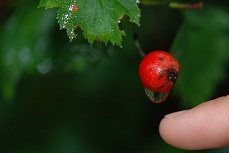Why Doesn't Cranberry Juice Help Urinary Tract Infection?
Date:2019-11-05 click:0
Urinary tract infection (UTI) can occur in any part of the urinary system, kidney, bladder, or urethra. More than three million Americans, mainly women, have urinary tract infections once every year.
Symptoms of urinary tract infection include frequent urination, dysuria, pelvic pain, and blood in the urine. Infection usually doesn't last long, and most patients can confirm by themselves.

For many people, the first thing that comes to mind is a box of cranberry juice. However, new research suggests that cranberry capsules may help, but cranberry juice is not everything.
Dr. Timothy Boone, associate dean of the Texas Center for Health Sciences School of medicine in Houston, and his colleagues wanted to know if cranberries really help with urinary tract infections. The team studied 160 patients aged 23 to 88 who underwent elective gynecological surgery between 2011 and 2013.
In general, 10-64% of women who undergo this procedure develop urinary tract infection after catheter removal. Half of the patients took two cranberry juice capsules twice a day - the equivalent of two 8 oz. glasses of cranberry juice - six weeks after surgery. Others took placebos.

Cranberry capsule reduces the risk of urinary tract infection by 50%. In the cranberry group, 19% of the patients had urinary tract infection, while 38% of the patients in the control group had urinary tract infection. So, how does it work?
In order to develop a urinary tract infection, bacteria must adhere to and invade the inner wall of the bladder. Cranberry contains type procyanidins (PACS), which interfere with bacterial adhesion to the bladder wall and reduce the possibility of infection.
However, the researchers noted that since Cranberry capsules provide the equivalent of 8 oz. of cranberry juice, patients need to consume large amounts of pure cranberry to prevent infection. "It takes a very high concentration of cranberry to prevent bacterial adhesion," explains Dr. Boone. The juice we drink doesn't reach the required concentration. It may be possible to go back to our ancestors' time, but there is absolutely no such possibility in modern times. "

"Cranberry juice, especially concentrated juice you can find in the grocery store, cannot be used to treat urinary tract infections or bladder infections," he added. It provides more water and maybe more effective at flushing bacteria out of your body, but the active ingredient of cranberry disappears before it reaches your bladder. "
He also warned that urinary tract infection and overactive bladder might have similar symptoms. If there are any adverse symptoms, people should see a doctor in time to prevent urinary tract infections from developing into a kidney infection.
Treatment of urinary tract infections can be complex. About 20-30% of women have recurrent urinary tract infections because of the drug resistance; many doctors and patients are less willing to use antibiotics for treatment. Therefore, probiotics are recommended as a safe alternative to antibiotics for the treatment of urinary tract infections.

Dr. Boone points out that probiotics have many benefits, although more research is needed. If you want to cure urinary tract infection thoroughly, you can also try Chinese herbal medicine Diuretic and Anti-inflammatory Pill. It is made up of more than 50 kinds of natural herbs, and the formula is ancient.
Its efficacy is stable and will not be easy to produce drug resistance, produce toxic and side effects on the nervous system and hematopoietic system, nor will it damage the liver and kidneys of the human body. Of course, because urinary tract infection is usually recurrent and stubborn, patients should also carry out consolidation treatment after taking the pills, which is very beneficial to reduce recurrence.



